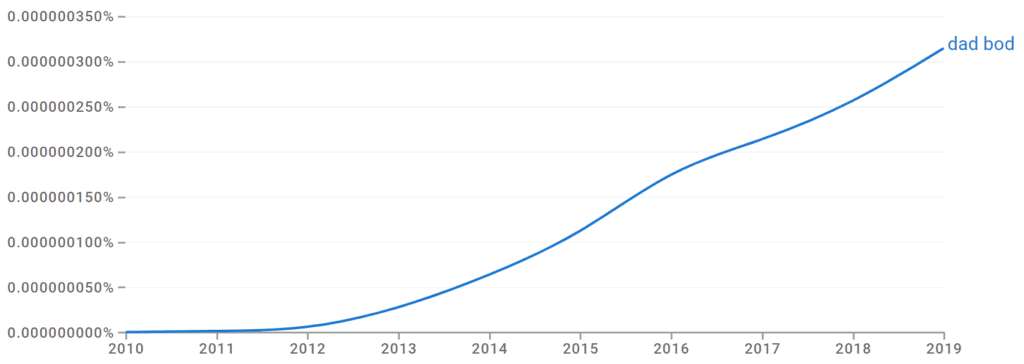What exactly is the meaning of dad bod? Can a man have a dad bod even if he isn’t a dad? Is dad bod an insult, and if so, why is it always talked about in an affectionate way?
If the American term dad bod has you confused, don’t worry, this article explains where this phrase came from and why it is a popular, modern description for a certain type of male physique.
What Is a Dad Bod?

The definition of a dad bod truly is in the eyes of the beholder. What one may perceive as a dad bod may differ from another viewpoint.
However, the term is generally (and loosely) accepted as the following: a male body that would traditionally be associated with a man who is the age of a youngish father and who has too many responsibilities to spend time and money on attaining the physique of a sculpted body by working out in a gym or to worry about losing weight.
The term dad bod describes a male body that is only slightly toned or has a slight muscle mass, though it is not muscular, and does not have pronounced abdominal muscles.
Someone with a dad bod may be skinny with a slight gut or have a bit more belly and body fat around the midsection. In their role on the television show Parks and Rec, the actors Chris Pratt and Seth Rogen are examples of men with a dad bod.
Many women find the male body, known as a dad bod, attractive, believing that a man who does not constantly worry about gaining weight or being overweight will be more genuine and present with their family.
While the Oxford English Dictionary lists the term as two separate words, dad bod, the expression is sometimes rendered with a hyphen, as in dad-bod, and as one word, as in dadbod.
What Are the Origins of Dad Bod?

The etymology of dad bod isn’t hard to dig up. It’s a modern term coined from the word dad, an affectionate term for a father, and bod, an abbreviation of the word body. Although no one person is attributed to its creation as it seems to have come about as slang, it did make its modern debut amongst the college-age crowd.
Dad bod seems to have been brought to the attention of the masses by Mackenzie Pearson, the author of the article Why Girls Love the Dad Bod. It was published in 2015 in her university newspaper, the Clemson Odyssey, as a means to address the intimidating, distracted, and slightly self-absorbed behaviors men with chiseled physiques occasionally radiated.
This university student maintained that ectomorphic boys with dad bods were more likely to cuddle, be attentive, and have more fun than a bodybuilder consumed with workout routines at the gym.
The word dad has long been used to describe something not quite cool to the younger generation, including dad rock, dad jeans, and dad jokes. But, ironically enough, all these things remain popular and purposefully kept alive in behavior and style practices that people love to hate while secretly enjoying (and preferring) them.
Examples of Dad Bod in Sentences
Curious to know how you can use the term in your writing and speech? Check these examples out:
- I thought I preferred the guys I used to see at the gym, but I got tired of eating good meals while they picked at salads; I’ll take a dad bod over a gym rat any day.
- Dad bods are cute and comfortable to lean against, unlike the sharp angles of a bony shoulder.
- It doesn’t matter if he has a dad bod or not; it’s his character that matters most to me.
- Sure, he has a dad bod, but I know he’ll enjoy going out for a good burger and a few beers rather than scheduling me around his gym time.
Let’s Review
The dad bod is a modern term that came into use through the combination of the words dad and body to highlight the difference in physiques when comparing young fathers to single, exercise-driven men.
Attentive fathers don’t have as much time to go to the gym and generally get a little “soft” compared to somebody who lifts or exercises daily and has a more fit body. Despite that, the term dad bod came about to affectionately point out that dad bods were attractive to a partner because these men were typically more approachable, less intimidating, and offered more of their time to a significant other.
The term continues to point out these physical differences, but it isn’t used negatively or disparagingly. Rather, it is a realistic observation that describes a person comfortable to be around physically and mentally.
